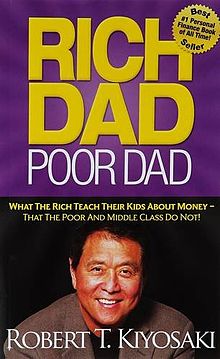There is a passage in Robert Kiyosaki’s Rich Dad, Poor Dad, in which he details the difference between being a best-selling author and being a best-writing author. In Rich Dad, Poor Dad, which was the longest-running bestseller on The New York Times, he chronicles a reporter who asks him how she can write a book that is as successful as his. He emphasizes to her that she is probably a much better writer than he is, but that he knows how to sell, which, he asserts, is what distinguishes his books from the many well-written books that go unnoticed each year.
Not to knock Kiyosaki’s book—it is an interesting and enjoyable read—but there are better books out there with more detailed, specific advice than that offered in the now-famous Rich Dad, Poor Dad that, let us not forget, was originally self-published (in 1997, no less, when self-publishing didn’t receive much credit), and, if you’ll note in the foreword, it mentions that the book is “as told to” someone. He has never professed to be a writer, yet he has had remarkable success as one, far more success than, say, someone who dreamed of writing their whole life, majored in English or journalism or creative writing, spent years honing their craft and planning their book, and working at a newspaper or in another job that perfected their writing.
- He has great titles. One area where Kiyosaki distinguishes himself is in having intriguing titles, like If You want to Be Rich & Happy: Don’t Go to School? Ensuring Lifetime Security for Yourself and Your Children. If you can, give your book a title that will elicit a strong reaction in people, whether you’re challenging a belief set (as in If You want to Be Rich & Happy: Don’t Go to School?) or selling a dream (for example, Helen Gurley-Brown’s Having It All: Success, Sex, Money, Even If You’re Starting with Nothing—are there any among us who don’t dream of having it all?).
- He promises to reveal secrets. We all know people who are more successful than us who, perhaps unfairly, we don’t believe deserve the success more than we do, whether we believe that we work harder or are more intelligent or are generally better people. Why is their life better than ours? There must be secrets or, perhaps, a single big secret (the entire premise behind the title The Secret), that no one has told us. We want to know it. We must know it. Successful authors of self-help books promise to reveal what no one else is willing to tell us. Truth be told, there really weren’t any big secrets in Rich Dad, Poor Dad, so much as a new perspective. For integrity’s sake, if you promise a secret, try to deliver.
- He had a publicist. With the right book, product, or personality, a public relations professional can make someone unknown famous—or at least credible—overnight. This statement oversimplifies the process, but a publicist can get you into major news outlets within hours of sending out your release. To maximize the potential for this to happen, it is advisable to start working with a PR professional as soon as you decide to start writing a book, because they will be able to advise you on what the media will and will not be interested in and guide everything from the content to the title to the cover to your personal brand in the right direction. They can also help you avoid tone-deaf messaging in your book—simple, innocent mistakes that, under the glare of the media spotlight, can become a problem for you. By starting early, you can go through the media training process while writing your book, so, as soon as it publishes, while the story is still hot, you are prepared to face interviews.
- He had been through sales training. Kiyosaki’s own advice to the would-be author was that she go through sales training. By going through sales training and truly understanding how sales work, you will improve sales in all aspects of your business, including selling more copies of your book. One of the key things that you will learn in sales training is how to identify your core audience and their needs. By doing this before you start writing a book, you will be able to understand exactly what your potential readers are looking for and provide it.
Many authors think of their book as their baby, and they don’t want to tarnish it or “sell out” by thinking of it from a business perspective. However, having your baby go out in the world and not make any friends is a painful experience. By applying public relations, marketing, and sales principles to your book, you, too, can be more than a “best-writing” author, you can be a best-selling author.





